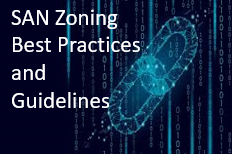| Course Duration |
: 1 Day - Face-To-Face Intructor
Led Workshop |
| Course Fee |
: Available upon request (Write
to us at
info@tlcpak.com) |
| Course Location |
: TLC (Karachi), Customer Onsite,
and Online |
|
: Online workshop are delivered
in two days, two units each day between 11 am to 1 pm and 3 pm to 5 pm |
| Course Code |
: TN584 |
| Deliverables |
: Comprehensive Student Guide and
Workshop Certificate |
This on-site couse can also be conducted
for customers in Lahore, and Islamabad
PURPOSE:
This instructor
led workshop is designed to develop skills in the area of setting up storage
security and the necessary information required to understand core fundamentals
of SAN Zoning. In this interactive workshop we will focusing on key zoning
features including standard guidelines, best practices, and business resilience
strategy from storage availability POV.
In a nut sell,
two criteria can help determine the effectiveness of a storage security
methodology. First, the cost of implementing the system should be a small
fraction of the value of the protected data. Second, it should cost a potential
hacker more, in terms of money and/or time, to compromise the system than
the protected data is worth.
TARGETED AUDIENCE:
This workshop
is equally ideal for end-user customers and technology vendors and their
business partnets, IT and security opertions, storage and systems administrators,
architects and security analysts, technology managers and presales professionals
including security, audit and legal teams who want to equipped themselves
with the foundational knowledge of SAN securities.
COURSE HIGHLIGHTS:
-
Analyzes how SAN
security concerns are handled.
-
How to determine the effectiveness of
a storage security.
-
Understanding LUN Masking and LUN Zoning.
-
SAN Zoning Best Practices and general
guidelines.
-
Threats that may confront FC implementations.
-
Business Resilience from storage security
PoV.
-
Differentiating between different types
of security zones.
ABOUT THE INSTRUCTOR:
This workshop shall be delivered
by TOGAF 9 Certified/IBM Certfied Infrastructure System Architect and an
experienced trainer with 25+ years of career experience imparting education
and training services both locally and internationally and have worked
for international enterprise technology vendors including IBM, Fujitsu,
and ICL. Our instructor holds various industry professional certifications
in the space of enterprise servers and storage technologies, Information
Security, Enterprise Architecture, ITIL, Cloud, Virtualization, Green IT,
and a co-author of 10 IBM Redbooks.
COURSE OUTLINE:
| Workshop Details
Unit 1 - Fundamentals of Storage Security &
Threats.
-
Threats and Security Challenges –Business
Context.
-
Leaders must avoid common myths related
to security.
-
Nine layers of IT Infrastructure layers
from security perspective.
-
Types of Threats, Motives and Methods.
-
Understand 9 layers of IT Infrastructure
Foundation from Security POV.
-
Five fundamental security principles
of Storage Security.
-
Understanding the role of Risk Management.
-
Issues that needs attention from storage
security POV.
-
Understand Storage Security Framework
and Attributes.
-
Understand threat vector and its implications.
-
Best principles for storage security
& Best Practices.
-
Hardening of the platform as a part
of common practice.
-
Storage security strategy and guiding
principles.
-
The Storage Threat Model –ISO/IEC 27040
Overview & Storage Security Management.
-
Unit Assessment.
Unit 2 - Distributed Denial-of-Service Mitigation
-
Understand Distributed Denial-of-Service
(DDoS) Attack.
-
DDoS Mitigation and Mitigation Stages.
-
DoS Verses DDoS Attack.
-
How does a DDoS attack work?
-
Differentiate between different categories
of DDoS attacks.
-
Symptoms of a DDoS attack.
-
What to do during a DDoS attack?
-
Countermeasures for mitigating DDoS
attacks.
-
Five steps to mitigate data breach risks.
-
Strategy to prevent DDoS attacks –Best
Practices.
-
DDoS Protection Services offered by
3rdParty Services Providers.
-
Unit Assessment.
 |
Unit 3 - SAN Zoning Principles
-
Explaining security threat path.
-
Risk Management and knowing your storage
risks.
-
How to determine the effectiveness of
a storage security.
-
SAN Security Defined.
-
What are WWNNs and WWPNs – Concepts.
-
Understand Host Bus Adapters and WWPN.
-
Describe igroup, Logical Unit Number.
-
Information you require to create a
LUN.
-
How all SAN components fits together
and SAN Zoning?
-
Differentiating between Hard and Soft
Zoning.
-
Characteristics of Zoning.
-
Understanding LUN Masking and LUN Zoning.
-
SAN Zoning Best Practices.
-
The worst case scenario of one big zone.
-
Creating zones for individual initiator
ports.
-
How to keep destinations isolated from
each other in “single-initiator, single-target” zoning.
-
MPIO Best Practices.
-
Considering Aliases for Zone Management.
-
Zoning is an important method to balance
the workload.
-
Securre configuration design for Disk
& Tape traffic.
-
Housekeeping as a part of general Best
Practices guideline.
-
Zone element Naming Conventions.
-
General Best Practices guideline and
Recommendations.
-
Threats that may confront FC implementations.
-
Business Resilience from storage security
PoV.
-
Unit Assessment.
|
|
|
          

|










































